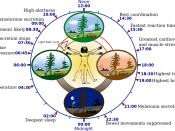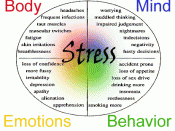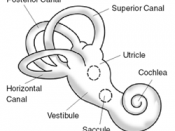This article was about finding emotional balance for the busy life of a woman. This day and age, stress is a normal part of everyday life. Women juggle careers, families, social commitments,finances, and more! There is a "normal stress" that is called eustress, which drives us to get things done and causes us to balance everyday stresses. There are two main factors that allow us to endure and actually enjoy the hectic pace of contemporary life, and they are balance and support. Balanced women stay focused and centered, and they create time for themselves. A support system may include family, friends, and co-workers who share in our lives. These people help us maintain balance by providing direction, encouragement, and gentle prodding when we start to lose focus. There is another type of stress called "dystress" that happens to us when we lose balance. It is painful stress that disrupts our ability to function normally and successfully.
It's important to be able to recognize signs of trouble coming your way. Distress can be caused by either external or internal events, and some are as follows: changes in life--positive or negative; excessive demands on your time; crises or traumatic events; career change; geographic change; unrealistic expectations of yourself or others; and feelings of helplessness. Everyone handles stress differently. What may be only stressful for one may be distressful for another. There are numerous symptoms that can alert us that we are becoming off balance, and they are as follows: irritability or anger; feeling sad or nervous; changes in appetite or sleep pattern; headache; feeling tense; loss of energy; and loss of ability to care about life or it's events. If you find yourself experiencing these symptoms of distress, take a deep breathe, and follow one or more of the following steps: prioritize personal and professional responsibilities; relearn the magic of saying "no"; set realistic expectations for yourself; allow others to help you; and never do yourself what technology can do for you.
Stress is one of the major triggers associated with depression in women. Almost every single adult will report suffering from an almost unbearable amount of stress at some point in their lives. This unbearable amount of stress is often responsible for depression in those who experience it. Unfortunately, women are much more likely to suffer from clinical depression than men. "The blues" doesn't come close to depression! Clinical depression is a mixture of behaviors including sadness, loss of interest in family and friends, anxiety, fatigue, changes in eating and feelings of worthlessness or hopelessness, to name a few. Not everyone experiences the same symptoms of depression, but those were the most common ones. Depression lingers because people can ignore its symptoms. But when left untreated, depression can get so severe that it leads to self-destructive behavior. Although few seek treatment, most types of depression can be successfully treated. We must keep in mind that depression is more than an attitude; most often, it's a biological problem.
Women are most likely to have their first encounter with depression during adolescence. Teenage girls face dramatic changes in roles and expectations, along with physical and hormonal changes. Some other triggers of depression in women's lives include menstruation, pregnancy, birth, child-rearing, and menopause. Women who experience depression, either in adolescence or along with childbearing, are at a higher risk than other women of experiencing depression again with the changes of menopause.
As we get older, emotional and physical conditions affect our well-being. We must educate ourselves so that we can recognize the symptoms of unhealthy emotional conditions, such as distress and depression. It is important to have friends and family for our support system, and to enjoy what we do, feeling like we make a difference in this world that we live in.





